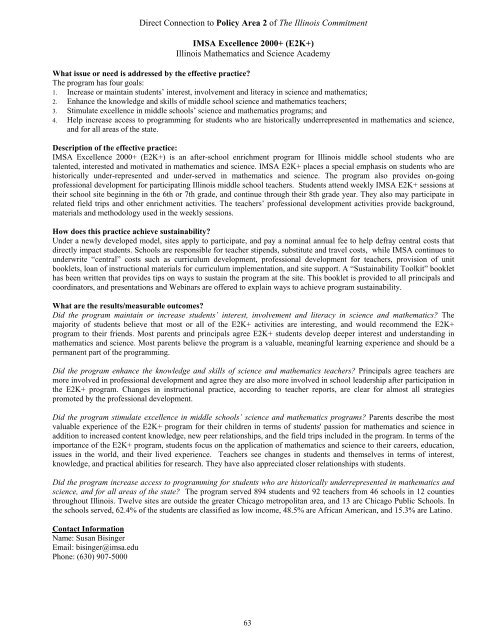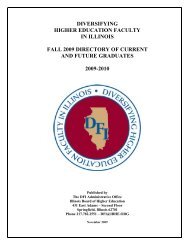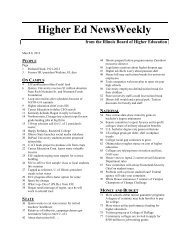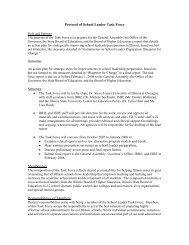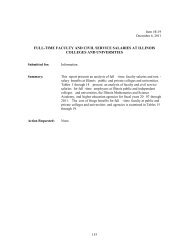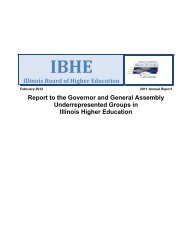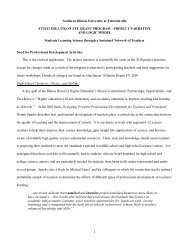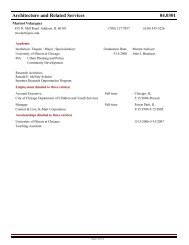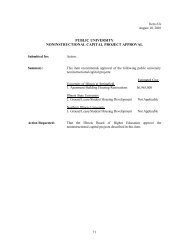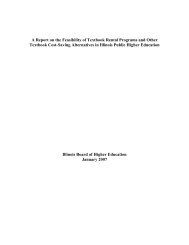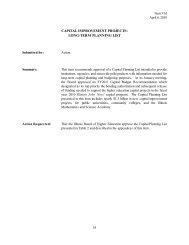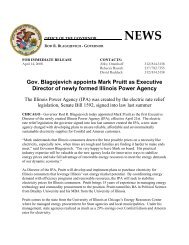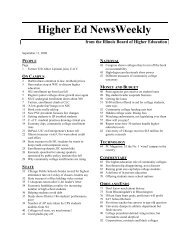Title of Effective Practice: - California Postsecondary Education ...
Title of Effective Practice: - California Postsecondary Education ...
Title of Effective Practice: - California Postsecondary Education ...
You also want an ePaper? Increase the reach of your titles
YUMPU automatically turns print PDFs into web optimized ePapers that Google loves.
Direct Connection to Policy Area 2 <strong>of</strong> The Illinois Commitment<br />
IMSA Excellence 2000+ (E2K+)<br />
Illinois Mathematics and Science Academy<br />
What issue or need is addressed by the effective practice?<br />
The program has four goals:<br />
1. Increase or maintain students’ interest, involvement and literacy in science and mathematics;<br />
2. Enhance the knowledge and skills <strong>of</strong> middle school science and mathematics teachers;<br />
3. Stimulate excellence in middle schools’ science and mathematics programs; and<br />
4. Help increase access to programming for students who are historically underrepresented in mathematics and science,<br />
and for all areas <strong>of</strong> the state.<br />
Description <strong>of</strong> the effective practice:<br />
IMSA Excellence 2000+ (E2K+) is an after-school enrichment program for Illinois middle school students who are<br />
talented, interested and motivated in mathematics and science. IMSA E2K+ places a special emphasis on students who are<br />
historically under-represented and under-served in mathematics and science. The program also provides on-going<br />
pr<strong>of</strong>essional development for participating Illinois middle school teachers. Students attend weekly IMSA E2K+ sessions at<br />
their school site beginning in the 6th or 7th grade, and continue through their 8th grade year. They also may participate in<br />
related field trips and other enrichment activities. The teachers’ pr<strong>of</strong>essional development activities provide background,<br />
materials and methodology used in the weekly sessions.<br />
How does this practice achieve sustainability?<br />
Under a newly developed model, sites apply to participate, and pay a nominal annual fee to help defray central costs that<br />
directly impact students. Schools are responsible for teacher stipends, substitute and travel costs, while IMSA continues to<br />
underwrite “central” costs such as curriculum development, pr<strong>of</strong>essional development for teachers, provision <strong>of</strong> unit<br />
booklets, loan <strong>of</strong> instructional materials for curriculum implementation, and site support. A “Sustainability Toolkit” booklet<br />
has been written that provides tips on ways to sustain the program at the site. This booklet is provided to all principals and<br />
coordinators, and presentations and Webinars are <strong>of</strong>fered to explain ways to achieve program sustainability.<br />
What are the results/measurable outcomes?<br />
Did the program maintain or increase students’ interest, involvement and literacy in science and mathematics? The<br />
majority <strong>of</strong> students believe that most or all <strong>of</strong> the E2K+ activities are interesting, and would recommend the E2K+<br />
program to their friends. Most parents and principals agree E2K+ students develop deeper interest and understanding in<br />
mathematics and science. Most parents believe the program is a valuable, meaningful learning experience and should be a<br />
permanent part <strong>of</strong> the programming.<br />
Did the program enhance the knowledge and skills <strong>of</strong> science and mathematics teachers? Principals agree teachers are<br />
more involved in pr<strong>of</strong>essional development and agree they are also more involved in school leadership after participation in<br />
the E2K+ program. Changes in instructional practice, according to teacher reports, are clear for almost all strategies<br />
promoted by the pr<strong>of</strong>essional development.<br />
Did the program stimulate excellence in middle schools’ science and mathematics programs? Parents describe the most<br />
valuable experience <strong>of</strong> the E2K+ program for their children in terms <strong>of</strong> students' passion for mathematics and science in<br />
addition to increased content knowledge, new peer relationships, and the field trips included in the program. In terms <strong>of</strong> the<br />
importance <strong>of</strong> the E2K+ program, students focus on the application <strong>of</strong> mathematics and science to their careers, education,<br />
issues in the world, and their lived experience. Teachers see changes in students and themselves in terms <strong>of</strong> interest,<br />
knowledge, and practical abilities for research. They have also appreciated closer relationships with students.<br />
Did the program increase access to programming for students who are historically underrepresented in mathematics and<br />
science, and for all areas <strong>of</strong> the state? The program served 894 students and 92 teachers from 46 schools in 12 counties<br />
throughout Illinois. Twelve sites are outside the greater Chicago metropolitan area, and 13 are Chicago Public Schools. In<br />
the schools served, 62.4% <strong>of</strong> the students are classified as low income, 48.5% are African American, and 15.3% are Latino.<br />
Contact Information<br />
Name: Susan Bisinger<br />
Email: bisinger@imsa.edu<br />
Phone: (630) 907-5000<br />
63


